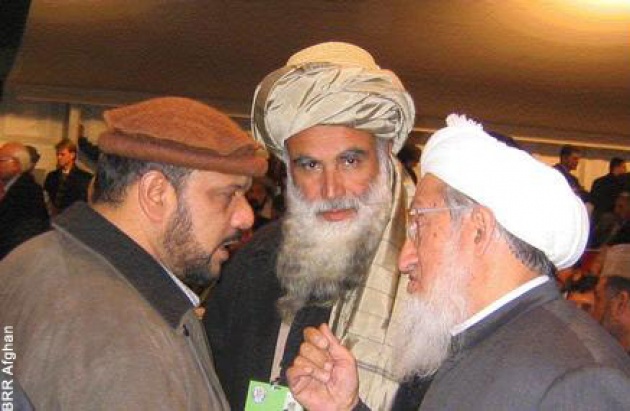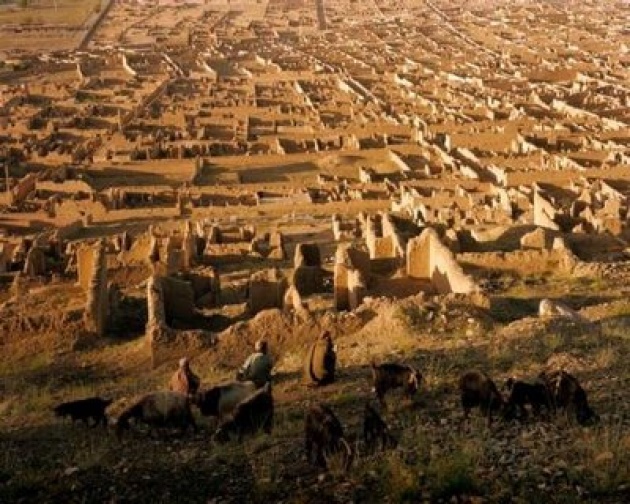Abdurrab Rasul Sayyaf, a prominent Afghan Islamist power broker, is rumored to be among the presidential candidates for the 2014 elections. This news puts an entire different perspective on the dynamics of the elections. Sayyaf does not enjoy any special ethnic powerbase in Afghanistan but is famous for his heinous role during the civil war in 1990s. He was the mastermind behind the Afshar massacre in 1992 in which more than 4000 people were ki lled, tortured, raped, or driven from their homes. He has won influence by exploiting religious sensitivities, from one regime to the next.
lled, tortured, raped, or driven from their homes. He has won influence by exploiting religious sensitivities, from one regime to the next.
There are unconfirmed rumors that Sayyaf’s candidacy is backed by president Karzai. However, Sayyaf himself has not officially announced, nor Karzai has any clear reason to support him. There are many better candidates for Karzai to endorse. President Karzai’s first priority in a nominee is one who has a realistic chance of winning the elections—of securing more than half of the votes. Secondly, Karzai’s choice has to be acceptable to the US and the international community. Sayyaf fulfills neither of these criteria, since he enjoys neither national popularity nor international credibility. Even in the unlikely event that he does announce, and wins the elections, Sayyaf would be rejected by the international community because of his record in the civil war. Few in the international community would find it easy to support such a fanatical figure. Thus, given President Karzai’s political acumen—at least as far as his own interests are concerned—it seems unlikely he would support a candidate like Sayyaf.
Sayaf seems to be aware of his position, and it seems he knows better than to engage in a fight he’s sure to lose. Thus, it is more consistent with Sayyaf’s interest to retain his influence in the presidential palace, rather than becoming an opposition of the next government. Sayyaf well knows that he can enjoy considerable influence in the next regime, unless the government commits to abiding by democratic values and rejecting the sectarian ones favored by the likes of Sayyaf.
However, if Sayyaf had reason to  believe that his role in the next government would be weakened, he may indeed use the election as a platform to launch a campaign of political pressure fed by appeals to religious values. He would charge them with an anti-Islamic agenda, calling them pro-Western puppets, and railing against modern values. He will do all these things in order to inflame religious sensitivities. Escalating such a religious war, Sayyaf would seek to mobilize the traditional elite (members of the clergy and previous Jihadi leaders) and to pose himself as a sacred defender of religious and Jihadi values that are under threat from the new order.
believe that his role in the next government would be weakened, he may indeed use the election as a platform to launch a campaign of political pressure fed by appeals to religious values. He would charge them with an anti-Islamic agenda, calling them pro-Western puppets, and railing against modern values. He will do all these things in order to inflame religious sensitivities. Escalating such a religious war, Sayyaf would seek to mobilize the traditional elite (members of the clergy and previous Jihadi leaders) and to pose himself as a sacred defender of religious and Jihadi values that are under threat from the new order.
Dealing with Sayaf has become a dilemma for all candidates who advocate democratic values.
On one hand, preventing him from entering the election will require paying tremendous bribe – money or power - to him, enough that he enjoys his influence and does not feel the need to enter the campaign in order to maintain or increase it.
Nevertheless, appeasing Sayyaf gives room to the corrupt mafia that has pervaded the current government. It won’t be possible to on the one hand, have Sayyaf as a privileged member of the government, and on the other hand, push the rest of the fanatical power brokers back. And any surrender to these kinds of fanatical leaders would be a clear violation of Afghanistan’s commitments to the international community. For Afghans, it means forgetting about the aid promised by the international community during the Chicago and Tokyo summits.
On the other hand, by ignoring Sayyaf we run the risk of provoking a religious war.
So Pro-democracy candidates are challenged by this dilemma: How to accommodate Sayyaf and his ilk, without eroding the democratic process and challenging the fragile state of the country.



